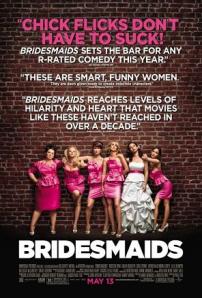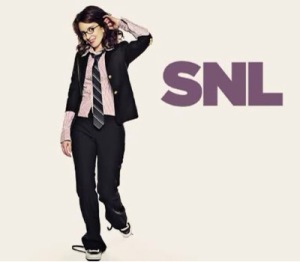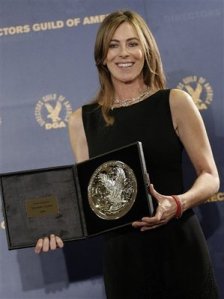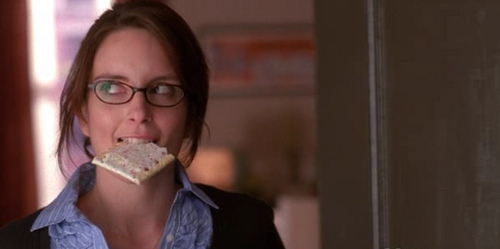 Written for and originally posted at Gozamos.
Written for and originally posted at Gozamos.
By now, you’ve probably heard a lot about the new comedy, Bridesmaids. It’s been called The Hangover for women and there’s a hilarious but disgusting food poisoning scene that you should really look out for (as if you could miss it). Now that the movie is out in theaters and opened in second at the box office (with Thor in first), the real question is: What does this successful comedy with an all-female cast mean for women and the future of film?
It seems a shame that in 2011 this is still up for discussion, but it’s true that Hollywood has been churning out tons of successful “bro” comedies lately, and somehow leaving plenty of room for dramatic female roles and little room for good, solid female comedies. On average, the most you’re going to get in that arena in a given year is another Reese Witherspoon rom-com – not exactly gut-splitting.
Bridesmaids is not only hysterical, it’s genius both dramatically and comically. It’s not “pretty funny for a chick flick” – this time, it sets the bar. The script was co-written by Saturday Night Live star Kristen Wiig (who also stars in the film as the lead and Maid of Honor, Annie), and Annie Mumolo – an improv actor and screenwriter who makes a brief cameo during the airplane scene.
By no means is Bridesmaids a film that will be used in Women’s Studies classes, but it is definitely the first since Mean Girls (2004 film written by and starring yet another Saturday Night Live star, Tina Fey) to truly succeed as a female-led blockbuster comedy that appeals to a general audience. The latter part is the most significant: for a female comedy to land as high as second at the box office, it must have universal appeal, and it must also surpass the bemoaned stamp of “chick flick.” (Read: men won’t voluntarily and excitedly run to a “chick flick,” and many women nowadays won’t either.)
Here’s the thing: the Bridesmaids plot is exactly as the title suggests. It’s a film about women in a bridal party (the bride is Lillian, played by Maya Rudolph) going through the standard, albeit sometimes cliché motions leading up to a wedding. While sitting in the theater before the movie, I looked around and realized that yes, indeed there was a pretty equal amount of men and women in the audience – and it was packed. Tons of men were here to see a movie about a bunch of women and bridal showers and bachelorette parties, and not because their girlfriends and wives dragged them.
But how and why? While the film is about gals and girly things, the jokes in this movie are too funny for anyone not to laugh regardless of gender. Wiig and Rudolph are already regarded as a few of the funniest women in comedy today and the supporting characters and numerous conflicts only make them shine more. Wiig’s performance is one of the most impressive parts of the movie as she transitions with ease from comedy to drama throughout.
Sure, scenes like a gross but roaring-laughter-inducing food poisoning scene at a bridal store help. However, Bridesmaids works for a general audience because it doesn’t have to rely on the gross-out jokes. Additionally, while Lillian’s other best friend, the wealthy and proper Helen (played by Rose Byrne) is competing with Annie for the power over the wedding festivities throughout the whole film, there are no cat fights just for the sake of humor. Real motives and feelings propel every funny aspect of the movie. The wedding events drive Annie and Lillian apart and challenge their longtime friendship. Meanwhile, Annie is falling apart professionally and personally, it explains her actions when she, say, starts destroying the flamboyant decorations at the bridal shower thrown by Helen. In Bridesmaids, believable human emotions and the valid complexities of friendship lead to many hilarious, over-the-top, but essentially plausible outbursts, fights, and mishaps. There’s a realistic storyline to Bridesmaids that strengthens its outlandish, shocking comedy.
These women are not only funny, but they feel real – something very welcome after too many stock, shrill, unremarkable female characters in romantic comedies. The dialogue between the characters – especially Annie and Lillian – is something that most women will find true to life. Thus, the whole film feels accessible: neither women nor men will find the friendships and situations out of reach or unbelievable. (After all, men can recognize realistic women characters too, you know.)
Simply put, there is no one scene where only women “get the joke” and men are left clueless. Everyone is clued in, which is no easy feat for a movie written by and revolving around women. Bridesmaids is overall a refreshing success and a big step forward for female comedies in Hollywood. For all the boys clubs and The Hangovers in the movie business, Kristen Wiig and company have overcome the stigmas and impressed all kinds of audiences – from feminists to men who love bro-coms to the most respected of movie critics.
On the official poster for the film, the very top quote from a movie critic reads in bold, pink letters: “Chick flicks don’t have to suck!” This is undoubtedly Bridesmaids’ most important contribution to the industry and to audiences. In the past, a movie with this plot could have and did suck. But this time, with all the elements of comedy and female power combined, the opportunity was seized, and it was universally awesome.






